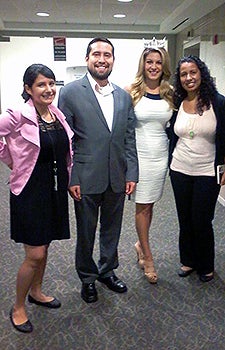Increasing Educational Opportunities
Emmanuel Caudillo clearly remembers the challenges he faced applying to college as a first-generation college student. Some of the forms he found daunting, particularly the Free Application for Federal Student Aid (FAFSA), which determines federal, state and university-level aid for students.
Unsure how to fill out the form, Caudillo sought advice from his parents. They were just as baffled. Caudillo persevered, researching how to complete his application, and received a financial aid package crucial to funding his studies at USC Dornsife where he earned his bachelor’s degree in political science in 2006.
Experiencing such obstacles firsthand prompted him to pursue a career in education policy.
“My passion for education stems from the challenges I faced as a first-generation college student,” Caudillo said. “Doing things like finding out by myself how to prepare for college, what classes to take, where to look to succeed while in college, where to find internships — I had to explore.”
He also saw some of his family members discontinue their college studies because financial responsibilities required them to work.
“I really wanted to see how best to help out — not just my family, but Hispanic students nationwide.”
Now Caudillo is working to ensure that Hispanic youths across the country have an easier time gaining access to college. One way he’s doing that is by helping to publish ¡Graduate! Financial Aid Guide to Success, a guide to help Hispanic students and families navigate the college application process. He’s also focusing on better access to early education programs and kindergarten through 12th-grade education for Hispanics.

Among other duties at the White House Initiative on Educational Excellence for Hispanics (WHIEEH), Caudillo oversees the internship program. Here, he stands with WHIEEH interns and 2013 Miss America Mallory Hytes Hagan, who met during the U.S. Department of Education’s annual “Let’s Read! Let’s Move!” program, which engages youth in reading, physical activity, and teaches them about healthy, affordable food.
Caudillo is a senior adviser with the White House Initiative on Educational Excellence for Hispanics (WHIEEH), which works to increase educational opportunities, improve educational outcomes, and deliver a complete and competitive education for all Hispanics. The largest and fastest-growing minority group in the U.S., Hispanics have the lowest educational attainment levels of any group in the country.
“With Hispanics making up about 25 percent of all K–12 students, it’s no longer OK if we can just get a few Hispanic students to graduate from high school and earn college degrees,” Caudillo said. “If we don’t increase the numbers, then our economy will suffer.”
Caudillo oversees many of the operational needs of the initiative including the budget. He works with Hispanic-serving institutions — a federal designation for certain higher education institutions that enroll more than 25 percent of full-time Hispanic undergraduates — to ensure they receive all resources available. He also supervises the initiative’s internship program, which allows him to mentor up-and-coming college students.
“I try to be a support system for them in their work,” Caudillo said. “I encourage them to take chances, be creative and ask questions. I share my journey with them, and provide any resources I can. I want to empower them.”
Caudillo said his time at USC Dornsife was pivotal in helping him determine his career path. As an undergraduate, he took advantage of opportunities available to him. He served in leadership roles in student organizations such as the University Residential Student Community. He also participated in the Cerrell Sacramento Seminar in Political Leadership through the Jesse M. Unruh Institute of Politics at USC Dornsife. Students in the program travel to California’s capital to meet executive and legislative leaders who shape state laws and policies.
“A lot of what we learned about dealt with the importance of communicating with your stakeholders, and being able to work with different groups of people,” Caudillo said. “That’s something I use in my work all the time at the initiative.”
Caudillo’s political science and public policy classes reinforced that he wanted to become a policy analyst. In one course that included an internship component, he worked in the office of Los Angeles Councilmember Bernard Parks, where he had a hands-on role researching policies for neighborhood safety, among other issues.
“I still talk about that experience to people,” Caudillo said. “I was able to really get my hands in policy development, and build my research and communications skills. It was a tremendous experience and a big confidence booster as well.”
Caudillo went on to earn his master’s in public policy from George Washington University. He was then hired to work at the Department of Education as a budget analyst for the Student Aid Administration. He had come a long way from his time struggling to fill out his FAFSA.
“When it’s your first day at the job and they say, ‘Congratulations you’re managing a $1 billion budget and, oh yeah, your budget account is one of the White House top budget accounts’ you’re like, ‘Wow. No pressure,’ ” Caudillo said.
Caudillo stays involved with the Trojan Family as a board member and scholarship chair of the USC Washington, D.C., Alumni Club. He said he is thankful for his experiences at USC, and is happy to give back to the USC community.
“As a first-generation student, I was grateful for the opportunities I had to immerse myself in learning and for the support system at USC, whether it was professors or the folks from student affairs,” Caudillo said. “I received a well-rounded experience that has helped me in my work with the White House initiative.
“The Trojan experience is paying off.”